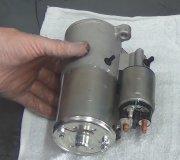New engine has been put in (the old one was hydro locked). Did some troubleshooting and excluded the battery, starter, relay and ignition module as culprits. The starter solenoid relay has been pulled out and when shorting the load side (30 & 87) of the solenoid relay the engine cranks. The voltage on all 4 starter solenoid relay terminals look good: the PCM grounds the control side 86 while the starter control provides 12V on 85. Also there is +12V at all times on pin 30. I also did test this further by pulling the starter solenoid wire out from the starter and did put a test light on it. The light stays lit with the key in start and goes off when key is in off. That tells me the ignition circuit must be working properly.
I connected an Autel MD-802 and I can only pull codes for a door module (known not to be working) and the TPMS (front wheels are removed).
I am slowly running out of ideas. Could there be something else that inhibits the starter and prevents it to crank at high load? If it can properly energize a test light this must be load related. Just to clarify: the voltage tests at the starter solenoid relay terminals were done with the relay out.
Any suggestions would be greatly appreciated. Thanks in advance!
SPONSORED LINKS
Sunday, December 13th, 2015 AT 10:00 AM




